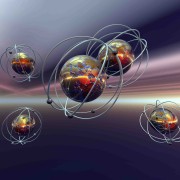Free Will in Quantum Mechanics
The natural laws as they were understood more than one hundred years ago were significantly different to how we know them today. The classical laws of motion described by Newton were, at the time, the ultimate guide to the future of the universe. In Newton’s universe, everything was determinable; if you knew the precise position and velocity of each particle and the forces acting upon them, you could predict the future with absolute certainty. Nothing was left to chance. It was only unfortunate that there were so many particles; nobody could do the calculations fast enough. Even if we were to attempt the same simulations with modern supercomputers, it would still be an impossible task. Hence precognition was, and still is, limited by the approximations you use to accommodate such a large universe.
With the theorisation of quantum mechanics, this world-view was radically changed. Whilst on the level of ordinary objects Newton’s laws were still incredibly useful, for individual particles this deterministic picture of nature became far from the truth. The position of an electron could only be known with limited accuracy. The time it took a proton to decay could be described by a probability, but it could wait until the final extreme of time itself before breaking down. A crucial element had crept into the mathematics: randomness. This spontaneity changed the universe from deterministic to probabilistic.
Some may think that this is fantastic news. In a universe where everything about the future could be known, regardless of whether or not it is known, there is no room for free will. It is one of the arguments against an omniscient god who grants its subjects free will, as a god who knows everything knows the future, and therefore prohibits free will. In a universe where the future cannot be known with total certainty, free will could fit in. Many see the randomness that is inherent in the universe as a means by which free will can influence it. The idea is that free will can force the random event in one direction or another, and by manipulating many of these random events, a large scale effect can be observed.
Some attribute this mechanism to the decisions of a benevolent god, some suggest that the free will of individual persons could manifest itself here. This second idea is perhaps more plausible, particularly given that it would be easier to affect the brain by this method than the planet or more, since the brain is smaller and dependent upon events which come much closer in size to the quantum scale: electrical neuron connections. There is also one downside to all of this: in order to not violate the laws of the universe, if a large scale event is pushed towards one outcome, it must be pushed towards another outcome on another occasion to rebalance the probabilities. Does that compensation then restrict free will? Not necessarily, it just means that the universe would have to respond to the whims of its inhabitants if it desired consistently in its laws.
But this would not be a perfect free will. Consider this hypothetical situation: as a being with free will, you could intend for the outcome of a certain event to be very specific over a large number of those events. This could compound an already improbable outcome into a nearly impossible sequence of events. In the realm of a thought-experiment, this could be an infinite sequence of events, rendering it impossible. Essentially, at some point, the universe would have to work against your decision and constrain or remove your free will (though it might be possible to avoid this with a universe which could become infinitely old).
So whilst quantum mechanics does perhaps permit our independence, there are prices to pay. If this kind of free will did exist for the human brain, we would have to be cautious and wise to the ways that it worked. We would have to decide which events we would influence and which we would not, to reserve our free will for the most favourable of circumstances. If this were the kind of free will that constrained a god, it would result in a god which could seldom perform miracles.

